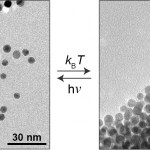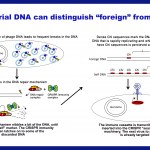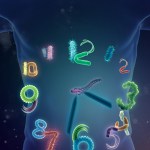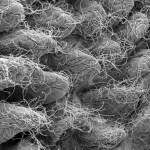microbiota
One day in the future, we may be treating our ailments with microbiotic combinations designed specifically to correct imbalances in our personal microbiomes. We’ll bring our prescriptions on rewritable paper and pay using shimmery optical chips embedded in our cell phone cases or maybe our jewelry. Or we’ll be waiting in our doctor’s office for a simple test of our microbiogenome to see if a light-based nanoparticle delivery treatment is working, while watching iridescent optical displays that change as we move...
These future scenarios (and many more) are all imaginary, but…
Foreigner or native-born? Your immune system discriminates between them, as do those of bacteria. Yes indeed, bacteria do have immune systems – pretty complex ones at that. And like any useful immune system, the bacterial ones must have a good technique for distinguishing “foreign” from “self.”
You may even have heard of the bacterial immune system: It’s called CRISPR, and it’s used in biology research around the world for DNA engineering and genome editing. CRISPR normally inserts short DNA sequences taken from phages – viruses that invade bacteria – into special slots called spacers within…
To all bits of clockwork that are adjusted in our bodies according to our day-night timetable, we can now add two more: cancer growth and the schedules of our internal complements of bacteria.
Cancer, according to a new Weizmann Institute study, may grow and spread more at night. In this scenario, our cells are getting messages left and right, day and night, and taking them in through the specialized receptors on their outer membranes. During the daytime, our bodies produce natural “wake-up” hormones, and these apparently, take precedence over other incoming messages, their receptors…
Could artificial sweeteners be helping cause the very thing they are supposed to prevent? They may well do so, and you can probably blame your microbiota – those masses of mostly-friendly bacteria that live in your gut. According to a paper by Weizmann Institute scientists that appeared today in Nature, artificial sweeteners not only encourage the wrong kind of bacteria to expand their numbers, they also induce mix-ups in the cross-communication between these bacteria and your body. Those mix-ups can lead to glucose intolerance – the first step toward metabolic syndrome and diabetes. So,…
The Not Exactly Pocket Science experiment continues after the vast majority of people who commented liked the pilot post. I'm really enjoying this, for quite unexpected reasons. It's forcing me to flex writing muscles that usually don't get much of a workout. Writing short pieces means being far more economical with language and detail than usual. It means packing in as much information as possible while still keeping things readable. And it means blitz-reading papers and writing quickly without losing any accuracy.
One quick note before the good stuff: last time, a few people suggested that…



